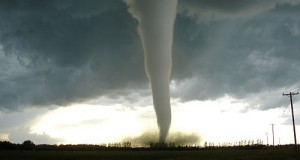Perhaps one of the hardest things to do when prepping is convincing family and friends to join you.
Ask any long-time prepper, and they’re likely to have had trouble discussing the topic with loved ones. Prepping isn’t something you can hide from immediate family, either. A basement full of food supplies would be hard to keep a secret, as would a cabinet stocked with guns and ammo.
Need help? You definitely can win people to your side, even through small, incremental ways.
1. Find examples of people and situations they can relate to. All of us know people who’ve suffered through a disaster, a sudden job loss, a health crisis or something that’s drastically disruptive of normal life. This is where facts and history can be your best resource. Whether they be calamitous events from recent history (Hurricanes Katrina and Sandy, the 2008 economic crisis) or those from decades past (World War II, The Great Depression), there always will be real-life devastations to discuss. If you stick to news and factual events, there’s a higher chance you’ll get people to seriously consider preparing for a disaster.
2. Use the government’s own advice. FEMA and DHS advice the public to be ready to be self-sufficient for at least 72 hours in the event of a natural or man-made disaster. This means one should be able to provide for one’s own shelter, first aid, food, water and sanitation for three days. This is because local responders may not be able to reach calamity victims immediately, or they may need to focus their efforts elsewhere.
3. Books, TV and movies might help. Hollywood never runs out of apocalyptic films to titillate people into thinking the end of the world can and will happen within our lifetime. World War Z. 2012. The Day After Tomorrow. If fiction won’t get your friends thinking, there are loads of non-fiction material they can peruse. Nat Geo documentaries like American Blackout and The Next Mega Tsunami point to the probability of a grid-down scenario and a devastating tsunami. Science-based books like Our Final Hour: A Scientist’s Warning – How Terror, Error and Environmental Disaster Threaten Humankind’s Future in this Century (Martin Rees), The Coming Plague: Newly Emerging Diseases in a World Out of Balance (Laurie Garett) and Cyberwar: The Next Threat to National Security and What to Do About it (Richard Clarke) explain just how fragile and vulnerable our world is to different kinds of calamities.
4. No date-setting. Don’t prognosticate that the world as we know it is sure to end next month, next quarter or next year. Even the best or most-followed financial analysts, geo-scientists, astrophysicists and prophetic preachers have made wrong predictions about when the dollar would collapse, when Planet X would do a fly-by or when the Lord’s return will be.
Are Your Prepared For Blackouts? Get Backup Electricity Today!
Again, just stick to realistic data about natural disasters, unemployment, soaring food prices and the closure of stores. They’ll get your drift.
5. Understand the diversity of people’s backgrounds and opinions – and be patient. Most people have not gone through any life-threatening crisis, so they’ll have a hard time relating to your concern. A great majority of the populace are too busy, distracted or simply too stressed from the regular demands of daily life. So, the concept of societal collapse may not only be foreign to them, but also a bit too far-fetched.
6. Pitch it on grounds of pragmatism and concern, not fear and paranoia. Tell loved ones you want them to prep out of genuine concern for their welfare, not just because hundreds of families are doing it on Doomsday Preppers. Pitch it as a smart, practical thing to do to provide for one’s family in cases of emergency. It’s not very different from taking out a health, accident or life insurance policy.
7. Go easy with the gals. Most women don’t take to guns and ammo as quickly as men do. There’s certainly a place and a time for learning to shoot and stockpiling weapons, but don’t let it be the start of a prepping discussion with the ladies. A better area to start on would be food security, such as gardening and food storage.
8. Wait. Once you’ve delivered your message, let it sink in. People take time to process surprising new concepts, and a doomsday situation is certainly a big one for them. Let them chew on it first, hoping they’ll come around to the wisdom of prepping, in due time. But give them leeway to approach the subject at their own pace.
9. Lead by example. When people see how serious you are in prepping, they just might see the value in it, too, on their own. Be the example of preparedness that they need. Once you’ve finished trying to convince them, you’ve done your part. People have the freedom to agree with you or not, anyway. If and when things do start to unravel, then you’d be in a great position to help them. Lastly, don’t give in to the temptation to say “I told you so.” That’s the last thing people want to hear when they’re suffering.
What advice would you add? Share it in the section below:
 Off The Grid News Better Ideas For Off The Grid Living
Off The Grid News Better Ideas For Off The Grid Living





